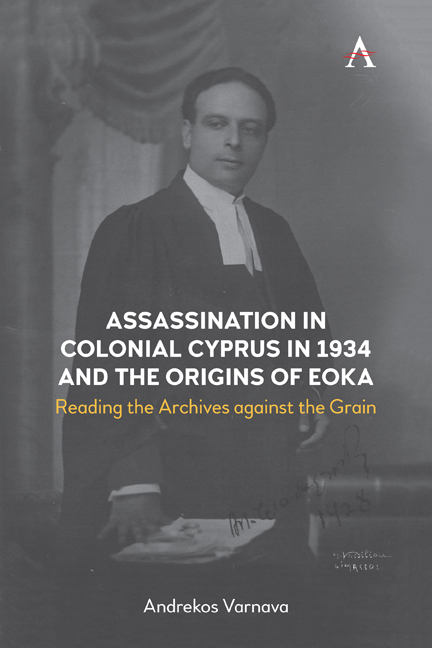 Assassination in Colonial Cyprus in 1934 and the Origins of EOKA
Assassination in Colonial Cyprus in 1934 and the Origins of EOKA Book contents
- Frontmatter
- Dedication
- Contents
- List of Figures
- Acknowledgements
- List of Abbreviations
- Note on Translations
- Introduction
- 1 Triantafyllides before his Assassination
- 2 The Colonial Newspaper Archive and the Triantafyllides Case
- 3 The Colonial Government Archive and the Triantafyllides Case
- 4 The Assassination of Triantafyllides and the EOKA Connection
- Conclusion
- Select Bibliography
- Index
- Frontmatter
- Dedication
- Contents
- List of Figures
- Acknowledgements
- List of Abbreviations
- Note on Translations
- Introduction
- 1 Triantafyllides before his Assassination
- 2 The Colonial Newspaper Archive and the Triantafyllides Case
- 3 The Colonial Government Archive and the Triantafyllides Case
- 4 The Assassination of Triantafyllides and the EOKA Connection
- Conclusion
- Select Bibliography
- Index
Summary
And the truth shall set you free.
Bible, John, Chapter 8, verse 32.After a long and hard day's work, partly in Larnaca, Antonios Triantafyllides, a leading Cypriot lawyer recently appointed to the government's new advisory council, arrived at his Nicosia home in the cool evening of 12 January 1934, only to be met with an assassin's bullets. He died the next morning. Twelve months later, Stavros Christodoulou was charged, but acquitted of murder. The assassination is a taboo subject for Cypriot society and historians alike, and a cold case that nobody has seemingly wanted to explore, until now.
This is true even when on 1 February 2002 Antonios's son, Michalakis A. Triantafyllides, made startling revelations in an interview on who was behind the assassination. Michalakis acknowledged that much was rumoured about it, but after discovering the ‘British file’ left in Cyprus, he found that his father had been a trusted friend of the Greek prime minister, Eleftherios Venizelos, and had decided to follow, along with others, the advice of Venizelos to cooperate with the British to achieve their acceptance of the union of Cyprus with Greece (enosis). This angered a group of ‘raging fanatics’ from Kyrenia, who claimed that such cooperation would kill enosis. To prevent this, they decided to assassinate one of the men cooperating with the British. They put four names in a hat, Antonios's ‘trusted’ physician drew his name out and they paid someone to do it. Michalakis was careful not to mention any names, but left little to the imagination, by referring to the ‘raging fanatics’ from Kyrenia and that the man accused of the shooting in court later approached him for forgiveness. When he was Attorney General (i.e., 1988–95) he was informed that the assassin was dying of cancer and that he wanted Michalakis to forgive him. Michalakis does not say if he visited him, but he did forgive him in a public statement, which the assassin did not appreciate and issued legal proceedings, forcing Michalakis to publish an apology. Clearly, he did not want the publicity of a libel case.
Despite what Michalakis stated in that interview there are still many unanswered questions, inconsistencies and gaps, and the subject remains controversial.
- Type
- Chapter
- Information
- Assassination in Colonial Cyprus in 1934 and the Origins of EOKAReading the Archives against the Grain, pp. 1 - 22Publisher: Anthem PressPrint publication year: 2021


